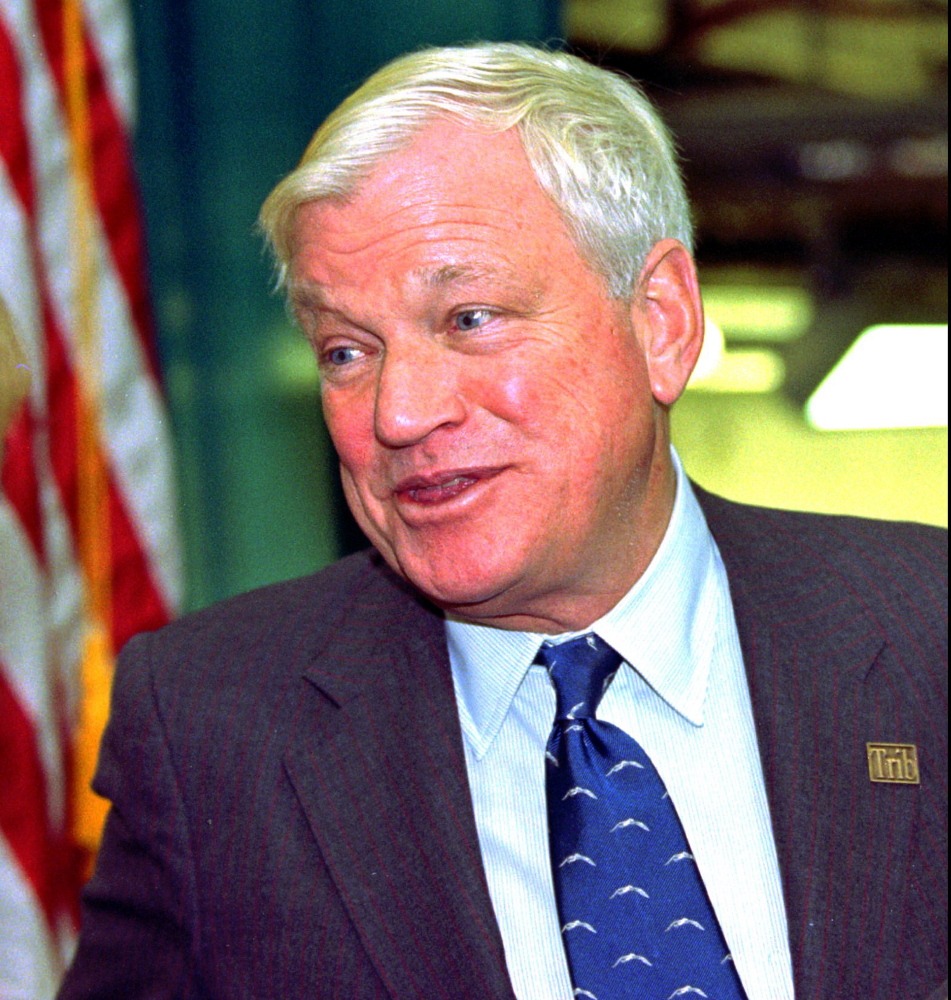Richard Mellon Scaife, a billionaire publisher whose philanthropy helped redefine the American right wing in the 1980s and 1990s and who helped underwrite a range of anti-liberal causes, most famously his political attacks against President Clinton, died Friday, a day after his 82nd birthday.
His newspaper, the Pittsburgh Tribune-Review, announced the death but did not disclose the cause. In May, Scaife wrote in the newspaper that he had “an untreatable form of cancer.”
An heir to the Mellon banking, oil and aluminum fortunes, the Pittsburgh-based Scaife spent hundreds of millions of dollars of his estimated net worth of $1.4 billion to counteract what he called “the liberal slant to American society.”
He threw his financial support behind conservative newspapers and magazines, including the American Spectator. Through those organs, his family-based funding entities and his presence on the boards of conservative and libertarian citadels such as the Heritage Foundation and the Hoover Institution, he championed small government, fewer regulations on business, low taxes and a strong national defense.
FRIEND OF HOOVER
Scaife’s conservative leanings were shaped during his youth. As a young man, he became friends with a family acquaintance, FBI Director J. Edgar Hoover. And in the 1964 presidential election, Scaife became a strong supporter of the small-government, anti-Communist candidate Sen. Barry Goldwater, R-Ariz., who lost in a landslide to President Lyndon Johnson.
With generous donations to later candidates such as Richard Nixon and Ronald Reagan, Scaife began building momentum for a conservative Republican resurgence. He also was a guiding force behind the Contract With America initiatives of House Speaker Newt Gingrich, R-Ga., in the early 1990s, as well as the Republican tea party progeny in the 21st century.
TEA PARTY SUPPORT
Scaife donated millions to tea party-friendly groups such as FreedomWorks, known for its anti-union campaigns and calls for reducing government regulation of business, privatizing Social Security and establishing English as the official language of the United States.
Throughout a life marked by bouts of alcoholism, two turbulent marriages and estrangement from many in his family, Scaife was, at times, an erratic shepherd of his deeply felt political beliefs.
Some of his most public causes were rooted in elaborate conspiracy theories.
He was a major underwriter of the American Spectator magazine’s “Arkansas Project” to develop financial and personal dirt on the Clintons in the 1990s. The effort included writer David Brock’s magazine story containing allegations from four Arkansas state troopers that they helped procure women for then-Gov. Bill Clinton.
Brock said he was suspicious of the troopers’ stories but supported their publication anyway, once telling The Washington Post, “I did what was politically useful. (Clinton) was a Democrat, therefore he was a target.”
Most notably, Scaife personally hired a freelance writer to try to establish that either Clinton or Hillary Rodham Clinton was instrumental in the death of Deputy White House Counsel Vincent Foster in 1993. Foster, a former law firm partner of the first lady, was found dead from a gunshot wound to the mouth in Fort Marcy Park in Fairfax County, Va.
ATTACKS ON CLINTONS
Three investigations, including one by Independent Counsel Kenneth Starr in 1997, a luminary in the conservative firmament, ruled the death a suicide.
Scaife was unpersuaded. In 1998, he told George magazine editor-in-chief John F. Kennedy Jr. that the Foster death was “the Rosetta stone to the Clinton administration,” referring to the ancient Egyptian stone used to decipher hieroglyphics, and that Bill Clinton “can order people done away with at his will. He’s got the entire federal government behind him.”
He also questioned Starr’s other investigations of Clinton’s activities, including the president’s affair with former White House intern Monica Lewinsky. “Four years and $40 million later, we haven’t gotten anything,” he said. “Maybe Ken Starr is a mole working for the Democrats.”
As a strong backer of the legal and political strategies against the Clintons, Scaife made Time magazine’s list of the 25 most influential Americans in 1997. The magazine called him the “horsepower” behind the “resurgent” right wing.
He was widely believed to have been among those that Hillary Clinton alleged were at the heart of a “vast right-wing conspiracy” against her husband for the constant attacks on his policies and personal life.
Scaife said at the time that he didn’t harbor any personal animosity against the Clintons and that his philanthropy was not solely directed against political opponents or liberal issues.
Send questions/comments to the editors.



Success. Please wait for the page to reload. If the page does not reload within 5 seconds, please refresh the page.
Enter your email and password to access comments.
Hi, to comment on stories you must . This profile is in addition to your subscription and website login.
Already have a commenting profile? .
Invalid username/password.
Please check your email to confirm and complete your registration.
Only subscribers are eligible to post comments. Please subscribe or login first for digital access. Here’s why.
Use the form below to reset your password. When you've submitted your account email, we will send an email with a reset code.